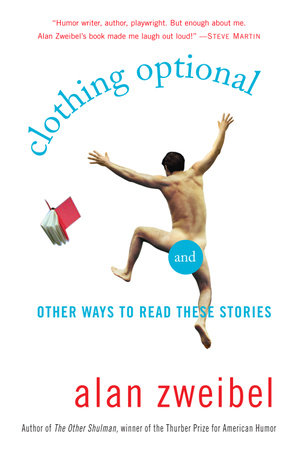A husband gets into bed at night. His wife speaks first.
–You okay?
–Not really.
–Want to talk about it?
–Not really.
–Honey, what’s wrong?
–Can’t say.
–Why?
–It’s too weird.
–What’s too weird?
–I’d rather not say.
–Now you’re scaring me.
–Why?
–Because we’ve been married a long time and I’ve never seen you this color before.
–Can’t help it.
–Why?
–Can’t say.
–Please tell me.
–Fine.
– ...Well?
–I saw your mother’s ass.
–What are you saying?
–That I saw your seventy-seven-year-old mother’s seventy-seven-year-old ass.
–How?
–I was on my way to the bathroom, a door was open, and there it was in all its horrifying glory.
–God, she must’ve been embarrassed.
–No.
–No?
–No.
–Why not?
–Because she didn’t see me.
–How’s it possible that you walk in on someone in the bathroom and they don’t see you?
–Because she wasn’t
in the bathroom.
–But you just said . . .
–I said that I was on my way to the bathroom.
–Oh...
–And I passed the gym, innocently looked in, and saw your mother on my stationary bike.
–Naked?
–Like a seventy-seven-year-old jaybird.
–From behind?
–Yes. That’s where her ass is. In the back.
–Wow.
–Yeah. Wow.
–I think you’ll get over it.
–I’m not so sure about that. In fact, I’m wondering how I can ever look at her again. In fact, I’m wondering if you and I should separate and get back together after she dies.
–You wouldn’t be overreacting, would you?
–Trust me, any normal man would be mortified.
–Come on, you’ve seen her in a bathing suit. I’m sure there were no surprises.
–Not so.
–What do you mean, “not so”?
–I can’t talk about it.
–What can’t you talk about?
–I can’t tell you. Now let me go to sleep, okay?
–Fine.
–Good night.
–Good night.
He turns off the light for about six seconds, then turns on the light and speaks.
–Did you know your mother has a tattoo?
–She does?
–Yep.
–Where?
–On her ass.
–She does not.
–I’m telling you . . .
–Oh, please . . .
–If you don’t believe me, go downstairs and see for yourself.
–No, thanks.
–You’re right–I should be the only one in this bed who’s scarred for life.
–She really does?
–Why would I make this up? Why would I possibly want this conversation to go any longer than it already has?
–May I ask what it’s a tattoo of?
–You sure you want to know?
–No. But tell me anyway.
–Ready?
–Yeah.
–Hitler.
–Hitler?
–Yep.
–My seventy-seven-year-old mother has a tattoo of Adolf Hitler on her ass?
–That’s right. And I must say that the führer looks less than thrilled to be there.
–Hard to blame him . . .
–Yeah, I feel bad for Hitler, too.
–And you’re sure that you’re not making this up?
–I’m not. ..
–Or mistook, let’s say, a mole, for Hitler?
–A mole for Hitler? No. And I didn’t mistake cellulite for Goebbels, either. This is a tattoo and it’s Hitler, and if you don’t believe me, go down and take a look for yourself.
–I think I will.
–Fine.
She gets out of bed, leaves the bedroom, and returns about a minute later.
–You’re right. It’s Hitler.
–Told you.
–Yes, but what you didn’t tell me was that every time my mother pedals, Hitler’s arm comes up in one of those Third Reich salutes.
–I thought I’d spare you.
–Thanks.
–So, what do we do now?
–What do you mean?
–Well, we’ve solved the mystery of who the tattoo is. Aren’t you at all curious as to why it’s there? As to why your seventy-seven-year-old Jewish mother, who’s been a registered Democrat since Truman was president, has a picture of the man who thought of the Final Solution on her butt?
–Yeah . ..
–Did she ever date Hitler?
–What?
–You know, they were young, impulsive, had too much to drink one night, took a cab downtown and got tattoos of each other before she realized he wasn’t such a great guy.
–That’s the scariest thing I’ve ever heard.
–How so?
–Because according to that scenario, Hitler, who was arguably the worst human being who ever lived, had a tattoo of my mother on
his butt.
–Well . ..
–You’re saying that in all those newsreels when he was giving those speeches and goose-stepping in those parades and invading Poland he may have had a picture of my mother on his ass.
–Anything’s possible.
–Jesus, could we please end this conversation?
–I’d love to.
–Fine. Good night.
–Good night, honey.
They turn off their lights. About a minute later, he speaks.
–I can’t sleep.
–Neither can I.
–I keep thinking about your mother’s ass.
–I keep thinking about Hitler’s ass.
–And I keep thinking I’ll need a new seat for my stationary bike.
Copyright © 2008 by Alan Zweibel. All rights reserved. No part of this excerpt may be reproduced or reprinted without permission in writing from the publisher.






